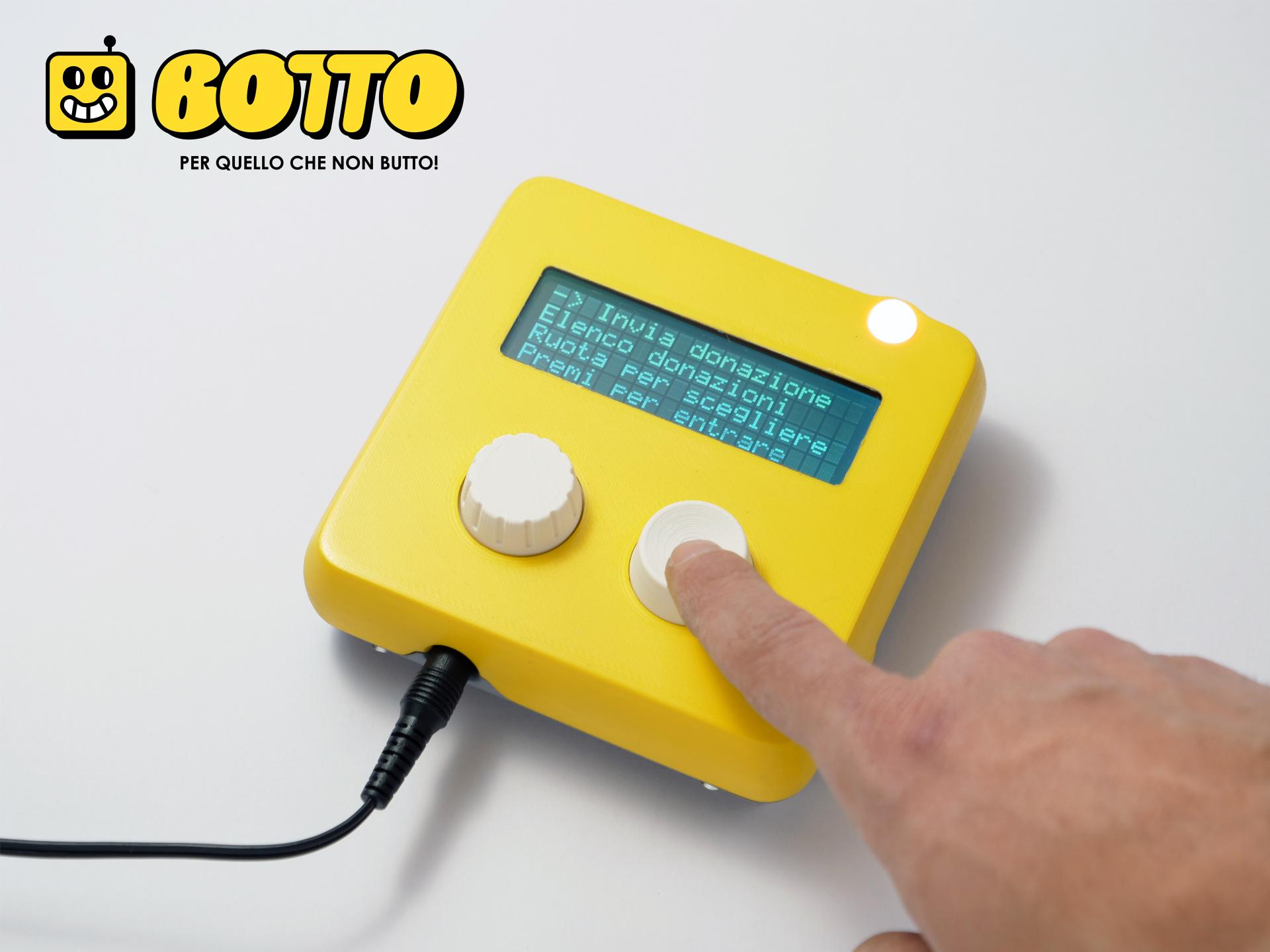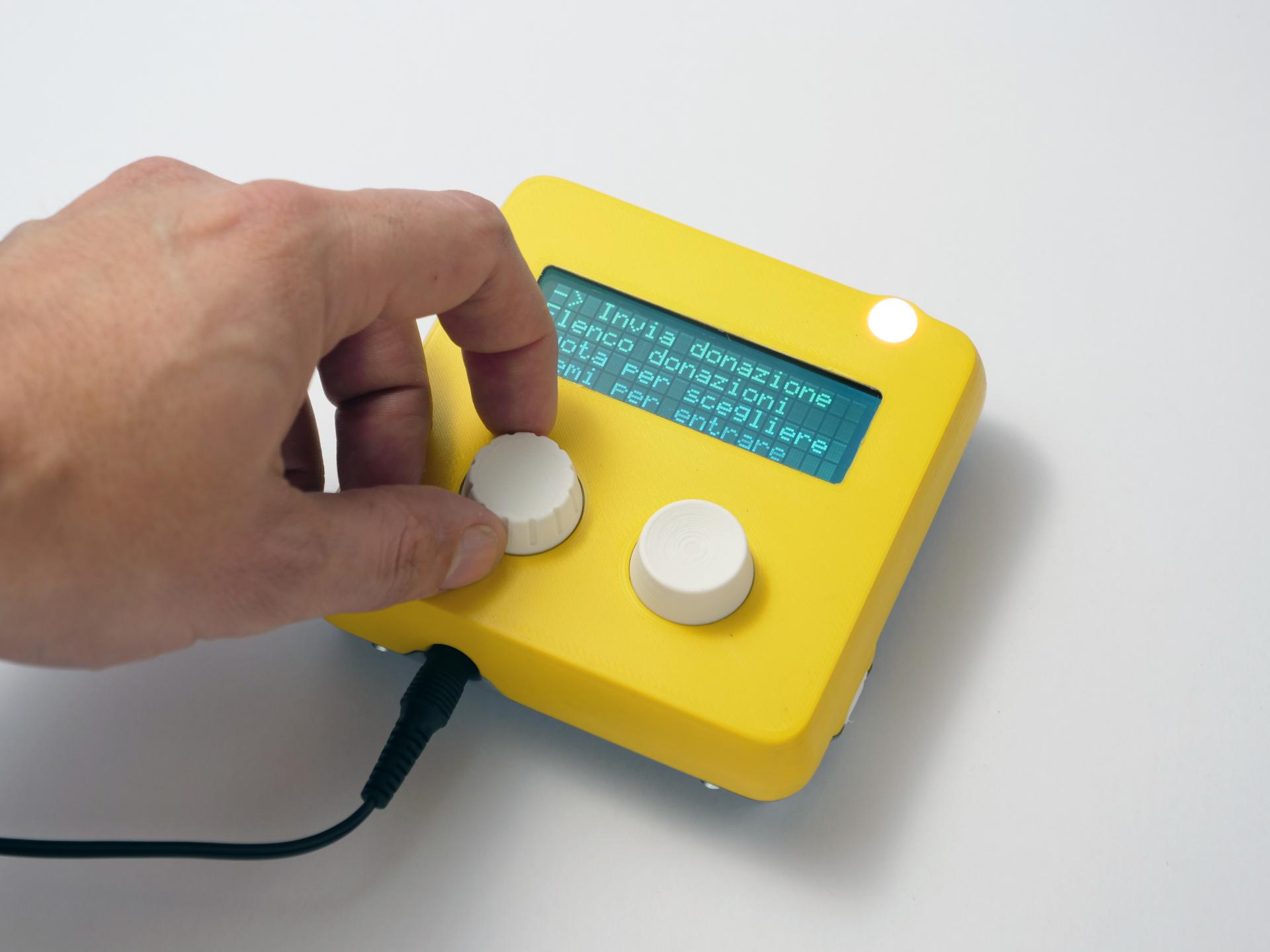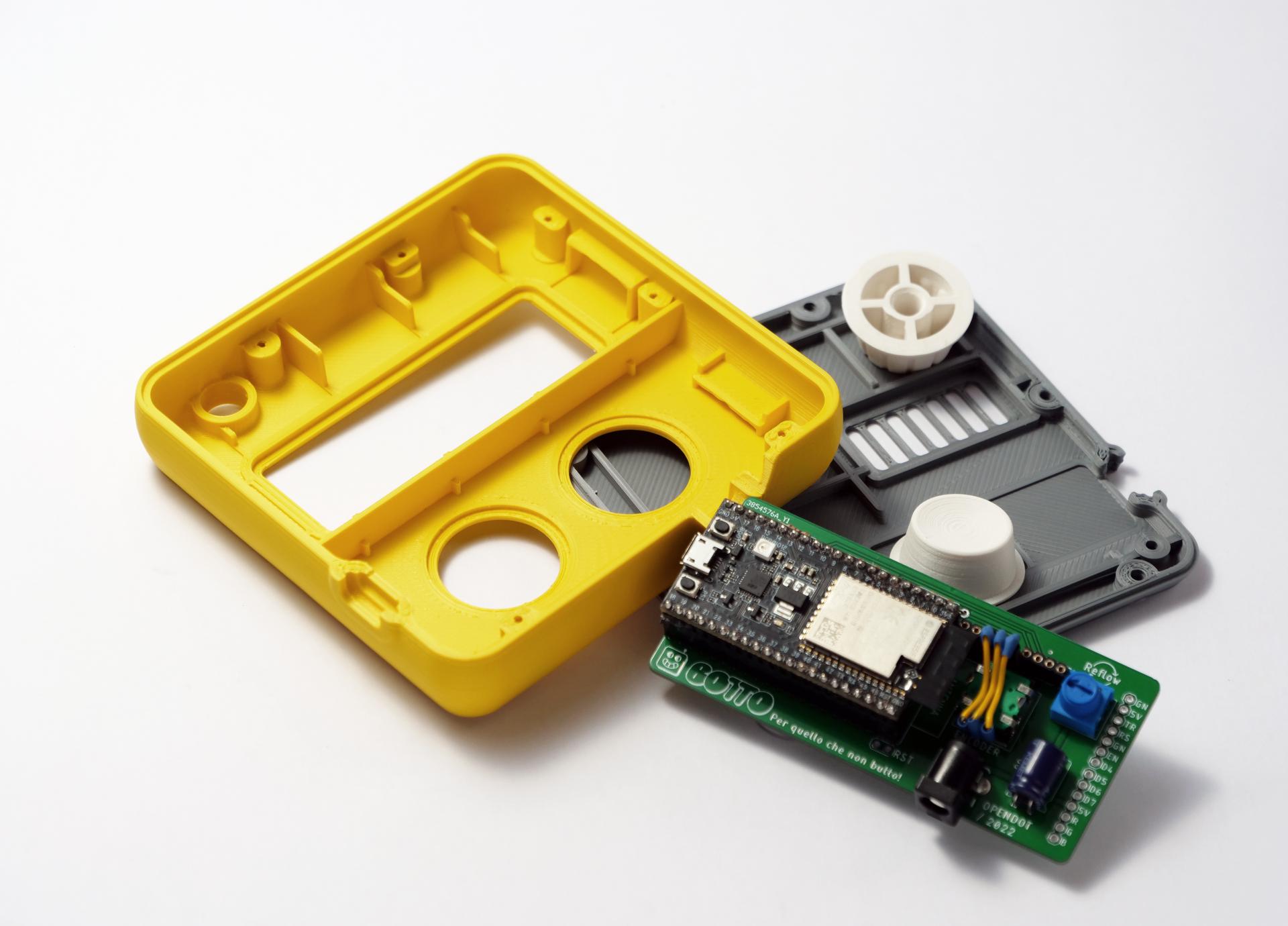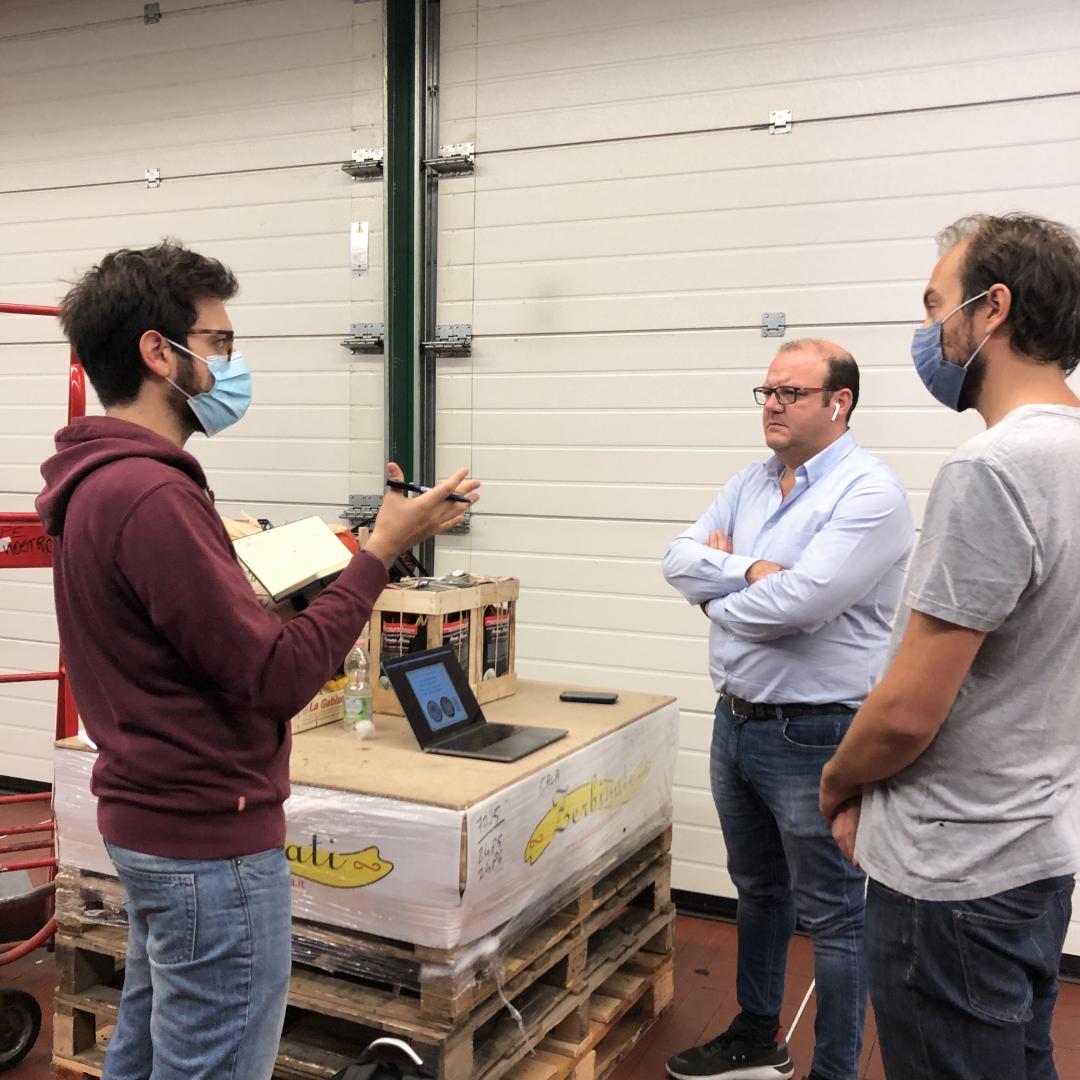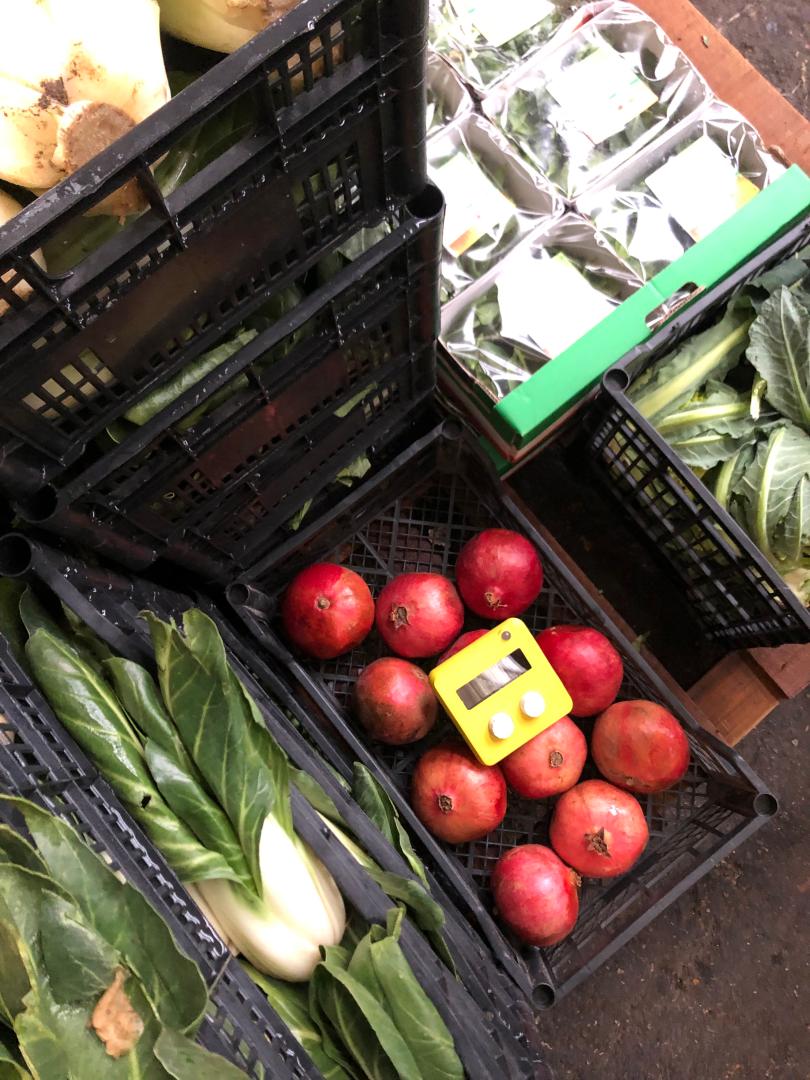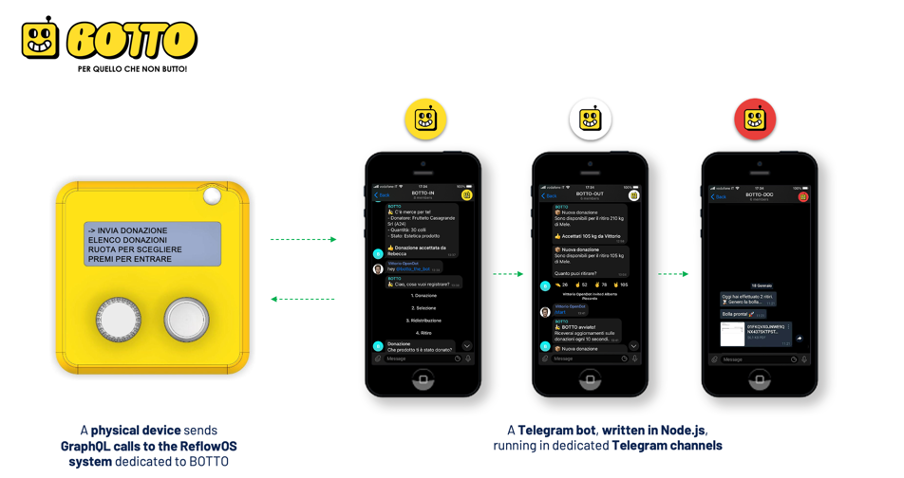BOTTO
Basic information
Project Title
Full project title
Category
Project Description
BOTTO is a product-service that facilitates the communication among wholesalers, associations that act for the donation of surplus food, and the ItalianRedCross. It has been designed & developed by OpenDot fab lab as a solution within the EU Project Reflow to make the city more sustainable, intervening on the food flow in urban areas. It is an IoT technology device which communicates with a Telegram Bot reporting & enabling a quick redistribution of the surplus production as donations
Geographical Scope
Project Region
Urban or rural issues
Physical or other transformations
EU Programme or fund
Which funds
Description of the project
Summary
BOTTO is a product-service designed and developed by OpenDot fab lab that facilitates the flow of communication among wholesalers, the association Recup that acts as intermediate for the donation of surplus fruit and vegetables, and the Italian Red Cross. OpenDot, together with the partners of the Milan pilot, has worked to make the city of Milan more circular by analyzing and intervening on the food flow in both urban and peri-urban areas.
BOTTO is made of an IoT technology device, similar to a remote control, and a Telegram Bot, designed to provide fruit and vegetables wholesalers with a quick and easy way to communicate what and how much of their surpluses can become a donation, simply by pressing a button. BOTTO sends the message to the ReflowOS digital platform monitored by a Telegram Bot, which reports the new donations with precise and constant monitoring of the entire process, and enables and facilitates the redistribution of selected goods in less than 30 minutes.
BOTTO has been tested in the wholesale market Foody of Milan, together with three wholesalers, Recup and the Italian Red Cross, and is ready to be scaled in another context. The test monitored and collected data which are accessible and visualized in a dashboard showing the quantity of food received, selected, donated and eventually wasted. For instance, in the first 3 weeks of testing, a total of 8700 kg quintals of food were donated from a total of 95 quintals of food collected.
Key objectives for sustainability
BOTTO was designed and developed by Opendot within Reflow - (https://reflowproject.eu/) - the EU Horizon2020 project designed to change the flow of urban materials thanks to regenerative circular solutions in synergy with companies, politics and citizens. BOTTO is one of the solutions designed to support the city of Milan’s vision on circular food by providing an easy product-service at the wholesale market level.
OpenDot, together with other local partners, has worked to make the city of Milan more sustainable by analyzing and intervening on the flow of food waste in urban and peri-urban areas. Through co-design processes OpenDot started mapping the flows of municipal markets to then focus on the wholesale food market, and engaged with a number of stakeholders in order to understand their needs to develop a solution.
From the analysis of food flows within the wholesale food market and the co-design sessions, some critical aspects emerged: (a) the identification of surplus production that could be saved and the redistribution to NGOs supporting people in need, are time consuming, (b) the logistics process is very complex and not able to actually track and trace the quantity of surplus production, (c) food donation requires a lot of paperwork for each actor involved, without necessarily obtaining any incentives in return.
Key objectives for aesthetics and quality
Human-centered design through technology can become a process facilitator: designing for people, and realizing solutions not only with affordable prices, but also aesthetically pleasing. In fact, thanks to digital fabrication and rapid prototyping, enabled by fab labs such as Opendot, it is possible to prototype and produce in a distributed and scalable way, and to adapt, customize or even create from scratch simple and more effective solutions.
Thanks to OpenDot’s experience in developing people and context based solutions, the co-design methodology has been used to facilitate the phases not only for the ideation and creation of BOTTO, but also to test new sustainable food logistics and circular practices.
Today BOTTO provides a quick and easy way to communicate between identified stakeholders (wholesalers, local producers, donation associations) what and how much of their surpluses can become a donation. BOTTO uses a digital platform and a Telegram channels to report the new donations through simple operations, with precise and constant monitoring of the entire process (quantity of surplus and the reason behind this surplus - i.e. ripening level, packaging problems etc), and enables and facilitates the redistribution of selected goods in less than 30 minutes.
Key objectives for inclusion
As it often happens, complex problems - such as food waste in urban markets - need to be answered with simple and innovative solutions which involve all the parties since the early stages of the design process, from the correct framing of the problem to the co-creation of the final solution. Therefore OpenDot has started a series of co-design tables with different stakeholders in order to map all the steps of the process directly from inside the markets, facilitating the circular flow and optimizing time and resources’ management. The team worked with commercial activities located in municipal covered markets, but also association and volunteers acting as intermediary for the donation of surplus fruit and vegetables. This project, together with the neighbourhood food hubs, contribute to the overall city strategy against food poverty. Collaborating with Market of Milano Foody So.Ge.M.I. and Recup, the Milanese association that fights food waste and social exclusion by operating in the local markets as intermediate to intercept surpluses and donate them to the Italian Red Cross, helped to understand the flow of goods and define the area of intervention. BOTTO’s system aims to facilitate the flow of communication of donations between all these actors.
BOTTO’s IoT technical device solution was designed and affordably prototyped thanks to digital fabrication methods.
Results in relation to category
As per today, BOTTO reports and enables a quick and easier redistribution of the surpluses as donations. It was tested in the real environment for a period of 3 weeks, from the 10th till the 25th of February. The testing phase began with the installation of the IoT technology device in each wholesalers' stand, and with one-to-one tutorials on how to use it. OpenDot supported RECUP and the wholesalers during the whole test phase, participating in their activities within Foody. At the end of the 3 weeks, a total of 9577,2 kilos were donated, 875,3 kilos went to waste, with a total of 8701,9 kilos given to people in need.
Despite the reduced period of time, interesting observations emerged from the testing phase through the data and feedback collected. BOTTO showed great potential in tracking data and simplifying communication, and satisfied the actors’ needs to create an even better and more intuitive flow. The tests also allowed us to collect a series of interesting information about the flows of food within the fruits and vegetables markets.
BOTTO (both the IoT technology device and the Telegram Bot) received positive feedback, and its use increased the quantity of food donated, spread awareness and curiosity by the citizens, and boosted the motivation of the staff involved.
How Citizens benefit
OpenDot organized a series of co-design tables with different stakeholders, and the team worked both with commercial activities located in municipal covered markets, and association and volunteers acting as intermediary for the donation of surplus fruit and vegetables. The co-design tables with all the stakeholders enabled the mapping of all the steps of the process directly from inside the markets, understanding real needs, facilitating the circular flow and optimizing time and resources’ management.
Thanks to this method it was possible to create a solution that answers to real issues and needs, as co-design makes space for diverse skills, knowledge, and experience to merge and come to new and meaningful solutions. Another outcome and advantage of this methodology is the capacity building of people, reflecting on circular thinking and possible circular flows, exploring and implementing circular practices and strategies to tackle urban challenges, sharing knowledge and experiences, fuelling multi-stakeholder collaboration and innovation, and becoming more technologically literate.
Physical or other transformations
Innovative character
There are some solutions in the field, such as Winnow - an AI-based software that tracks food waste from small to industrial kitchens, suggesting ways to rework food resources or use them for staff food samples; or Leanpath - an AI-based software that tracks food to prevent waste in the foodservice sector. Goodr, instead, is a food surplus logistics management company to donate edible surplus food. But all of these projects are partial, where BOTTO combines a software track solution with a logistic and redistribution system.
Other innovative characteristics of BOTTO solution – that shows a different approach if compared to mainstream practices - are the system of donation instead of sales (as for the App “Too good to go”), a both high and low tech perspective, the direct involvement of market salers and the work with wholesales market instead of an action at the end of the supply chain, and, last but not least, its replicability and scalability, since it can work for other products than fruits and vegetables.
Learning transferred to other parties
In light of COVID-19 outbreak and consequent disruption of food systems caused by national lockdowns, building a more widespread and resilient food sharing economy has become more and more crucial, as well as fostering sustainable food production and consumption. Many food sharing initiatives have spontaneously multiplied at urban level, increasing food security for marginalized people, and bottom-up community-led innovations like Botto can support cities in this environmental and social process. In line also with the EU GreenDeal, digital applications are in fact emerging and reshaping how resources flow within cities, unlocking the value from circular economy strategies, &harnessing the potential of data for public good. Co-creating and testing regenerative solutions at business, governance, and citizen levels allows to create a resilient circular economy, present IT solutions and reflect on how a digital circular economy could be scaled up at EU level to make the most out of its potential
BOTTO is a concrete application and solution, and its long term purpose is to impact food and market policies, making current practices of the 23 local milanese city markets more circular, and then make this type of solution available for, potentially, other foreign wholesales'markets, and also other flows&waste such as fashion items, wooden materials, and so on. The ReflowOS operating system is designed to empower autonomous communities to create federated and secure economic networks to foster the creation and improve the coordination of distributed &circular value chains. It became useful to model the flow of events occurring between each swap and keep track of associated relevant data.
The code of Botto is open-source, hosted on GitHub.The code of the IoT device’s components, along with other technical information as well as some documentation of the prototype, can be found here. The source code &installation instructions of Telegram Bot can be found here.

